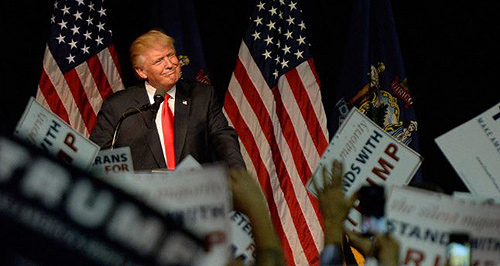Make / Model Search
News - General News - ManufacturingTrump victory has car-makers scramblingTrumped: Audi built a new factory in Mexico to make the new Q5, but question marks hang over the viability of such factories if US president-elect Donald Trump throws up trade barriers. Mexican trade barrier fears throw German factory investments out of gear11 Nov 2016 GERMAN car-makers Volkswagen, Audi, Mercedes-Benz and BMW are among the global manufacturers trying to weigh up the potential ramifications of Donald Trump’s come-from-behind victory in the United States presidential election. Audi, for example, has just opened a new plant in Mexico to build the new-generation Q5 for global markets, including Australia, where the luxury SUV is set to go on sale in the second half of 2017. The factory was built south of the border to take advantage of the North American Free Trade Agreement (NAFTA) that Mr Trump has threatened to tear up and replace with a 35 per cent tariff if Mexico does not renegotiate it to his satisfaction. BMW is in the process of building a new factory to make 3 Series and another unspecified model in Mexico from 2019. Mercedes-Benz is also planning to produce cars there in a factory shared with the Renault-Nissan Alliance. Although the models have not been confirmed, rumours suggest it will turn out the next Mercedes GLA from 2018 and an Infiniti compact model from next year. Volkswagen is a long-time Mexican manufacturer, building a wide range of vehicles there for North America and other markets, including Australia, which previously sourced the Beetle from there but now only takes the Jetta small sedan. So far this year, VW Australia has sold 1712 Mexican-built Jettas – almost half the 2850 Mexican-sourced cars registered in Australia to the end of October. Other cars from Mexico are all Fiat Chrysler products – the recently discontinued Dodge Journey, Fiat Freemont and Ram Laramie and Big Horn. While changes to NAFTA are not expected to directly impact Mexican car exports to Australia, any trade barriers thrown up by Mr Trump’s administration will affect the viability of many Mexican factories, as the US is clearly the main target market for the bulk of the vehicles. As one car company executive told GoAuto, Mr Trump’s conciliatory tones in his victory speech gives manufacturers hope that the anti-free-trade rhetoric of the election campaign will not translate into harsh actions. However, Mr Trump owes his victory to a large degree to voters in the so-called rust-belt states of the Great Lakes and Midwest, where auto factories of the Big Three American car-makers have been closing, with production of many models shifting to Mexico. He promised voters in states such as Michigan and Ohio to take action on this job migration, and they will now want to see it. Companies such as General Motors have already indicated that they will now negotiate with Mr Trump on these points. GM said in a statement on Wednesday that it “looks forward to working with President-elect Trump and the new Congress on policies that support a strong and competitive US manufacturing base”. Ironically, the statement came just a day after GM announced it was planning to suspend third shifts at two of its plants in Michigan and Ohio in the first quarter of 2017 due to slowing sales. While Mr Trump has railed against free-trade agreements, Australia’s foreign minister, Julie Bishop, said she believes the Australian-US FTA will not be affected, mainly because America has a trade surplus with Australia. In automotive terms, the US manufacturers have shipped more than 44,000 vehicles to Australia this year – ranging from BMW X5s to Nissan Pathfinders – while the only cars going the other direction are a handful of Holden-built Chevrolet SS and Caprice police pursuit vehicles, both of which will soon be defunct when Holden closes local manufacturing in 2017. More likely to bite the dust is the planned Trans Pacific Partnership (TPP) that would have locked Australia into a broader free-trade agreement across Asia and North America. As Australia already has bilateral agreements either signed or under discussion with most of the countries involved in the TPP – particularly big automotive exporters such as Japan and Thailand – it is unlikely to make too many waves.  |
Click to shareGeneral News articlesResearch General News Motor industry news |









Facebook Twitter Instagram